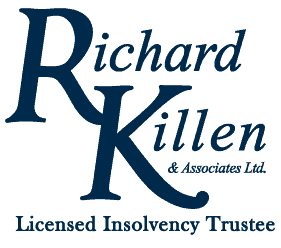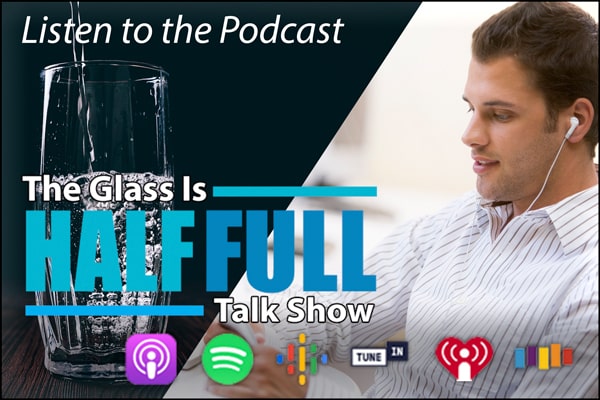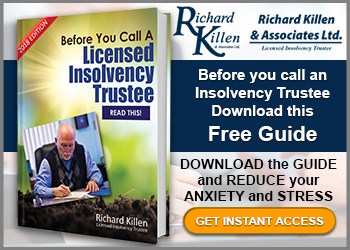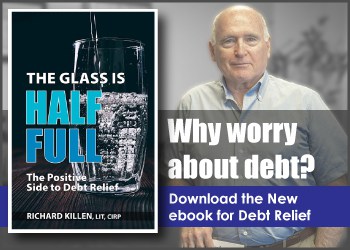Ambitious Adulting: How to Reach Financial Security in Your 20s
Posted on: June 18, 2020Posted in Interviews, Videos | Comments Off on Ambitious Adulting: How to Reach Financial Security in Your 20s
This video episode talks about how you can manage your finances, make worthwhile investments and reach financial security in your 20s.
Intro:
Welcome to The Glass Is Half Full Talk Show. Let’s face it, life can be tough in many ways. Here on The Glass Is Half Full we focus on how life is tough financially. Dealing with these financial realities can be a challenge. Essentially, we have to find ways to do more with less, less money that is. The show is focused on helping you discover ways to achieve that goal, even if you don’t have a lot of money to work with. We’ll be meeting people from many different walks of life. They’ll share their stories and expertise, looking to do more with less and maintain a positive attitude while you’re doing it. Welcome to The Glass Is Half Full. Now let’s join Sean and his guest in the studio.
| Sean | Hi everybody, Sean Killen here from The Glass Is Half Full channel, we’re here with Liz Enriquez, who has a fantastic story I was reading about, and thought nothing better than to get her on and let her fill in the blanks for us and help us understand how to be as successful as she has been able to become. Hi Liz, how you doing? |
| Liz | I’m well, thank you Sean for having me. |
| Sean | Of course, thank you for coming. So, I’m not even too sure where to start, I mean, there are so many different aspects to your story that are interesting, I’m sure of interest to everybody. Do you want to tell me where you’d like to start telling us about your story? |
| Liz | I guess we can start from the beginning. |
| Sean | Well, way back when you were five. |
| Liz | Yeah, way back to then. I think it’s really important when we talk about finances to kind of understand where people are coming from. Their money blueprints and kind of what happened in their childhood or growing up to frame them and shape them into the adult that they are. And so many people like to spend the way they do and save the way they do based on kind of what they saw their parents doing. I think that’s, that was like a really important realization for me because I watched my parents, you know, we moved from Mexico and I watched them like work really hard to stretch a dollar. And I saw how hard it took, like how much work it took to make money so that drive is really what is instilled in me and I really give a lot of credit to my parents for showing us a really strong work ethic. That’s a little bit of how it all began. I started two businesses. I quit my full-time job, and I’ve been really hustling for a long time. But it really started because I watched my parents hustle. |
| Sean | So was there any just, as a point of curiosity, was there any particular thing when you were so young? Most kids don’t even start conceiving of the idea of money until they’re much older, I would expect. Is there any particular kind of kick-started your drive other than the general? |
| Liz | Definitely moving from Mexico. I think one of the earliest memories is going into like a thrift store and having to buy all of our clothes from scratch because, you know, we came from Mexico. We didn’t have winter clothes. We didn’t really have anything to keep us warm and never been to a thrift store before. So that was kind of an interesting experience for me. I was still really young, but I just remember all these things like seeping into my mind and into my memory when I think back I’m like, oh, I definitely remember going to the thrift store and yeah, and then also being in school and then having definitely not the latest brands in the latest fashions. Everyone else had way warmer clothes, way cooler looking things. And I felt yeah, just kind of comparing myself to everybody else was really impactful. And I definitely didn’t feel like I belonged, I felt really behind everybody else. So all of those feelings help me, you know, kick start all the stuff that I wanted to do because I didn’t want to feel like that. |
| Sean | Your parents brought you into the equation as far as that we only have a certain amount of money here, so we want to stretch it, you know, getting you on board with how to help with that, or you just picked that up on your own? |
| Liz | Well, they pretty much said no to everything. Anything I wanted to do. Yeah, so there was no choice, really. You know, I also remember, like, not really going on field trips when everybody else got to go on field trips because we didn’t really have money to pay for the extra $20 ticket or all that stuff, so I’d have to skip out on those. So all that was really important for me, that, you know, to shape the way I am now. |
| Sean | Right. Got to find motivation where you can, right? |
| Liz | Yeah, and I never blamed my parents. Like I always knew that they worked really hard, so I didn’t really, like, obviously, I felt a little bit out of place and resentful that everybody else got to do things. But I always knew that my parents were working hard, so I just thought, OK, this is temporary, |
| Sean | Right? But also may have opened your mind up to the responsibility side, right? |
| Liz | Yeah, I mean, it definitely put a spark in me that said okay, if I want something, I have to go work for it because I can’t really ask my parents for money. So I started working when I was, like, 11, I got my newspaper route, and you don’t make a lot of money delivering the newspaper, but |
| Sean | I did that myself. I do know what you mean, absolutely. |
| Liz | Yeah, you know, you’re not really making money, but, you know, just starting that getting into those habits and seeing a little bit of pocket change come my way. I was like, Okay, this is what I have to do. And this is one of the steps that is going to help me make money. And then from there, I just kept building up and building up, |
| Sean | Right? All right, and so then what happened next? |
| Liz | Well, really, I wanted to get out of the house because even though I have a great relationship with my parents, you know, I was 18, they were super, super strict. They wouldn’t give me any money and I thought I just need to get out of here, so of course, I couldn’t. I couldn’t afford to move because I was still, like 17 or 18. This is really when I started having anxiety attacks because I didn’t know how I was going to afford my life. I wanted to go to university. I wanted to move out. I wanted to live on my own. And I looked at how much everything costs. And I was so overwhelmed with the tuition costs alone. I think I had $500 to my name and tuition was, like $6,000 plus rent plus food. I was looking at, like $8,000 that I needed. And I could not conceptualize how I can go from $500 that I had to get $8,000 that I needed. Like that is a huge gap that I did not understand how I could even close that gap. So those thoughts were super overwhelming. So after, you know, some anxiety attacks, after kind of working through what was really going on, I made my first budget and made my first plan. I thought, OK, I obviously need to get a higher paying job because I was just babysitting, so I was not making enough money to do anything. And I thought, OK, what job was going to pay me this kind of money to help me go to school? Then I started realizing that there were scholarships and bursaries, so I thought, maybe this is the direction that I should focus my energy on because I had good grades. I was an active volunteer, so I thought, OK, let me just focus on this. So I started applying. I actually dropped my math class in grade 12. Yeah, I just was like this is too hard. And I dropped it. And I used that period for full-time scholarship hunting. So instead of you know, most people would drop a class and then go home and I don’t know, do what? |
| Sean | Go to the mall. |
| Liz | Yeah, go to the mall. I dropped that class, went straight to the guidance counselor’s office and treated that as a class and then wrote essays, submitted applications and by the end of the semester, I had my first year covered of University and then the next half of second-year covered. So you know all of that I thought, Okay, that really taught me to look at creative solutions instead of just getting defeated because I had to figure out how I was going to find this money quickly. I had to really look at creative solutions and then dedicate a lot of time. Nobody just handed me these scholarships because my grades were good, but definitely not, you know, amazing that I was just handed these scholarships like they were high, low eighties, mid-eighties. Just like good enough. |
| Sean | Well, hard for anybody, hard to conceive of anybody not being able to look at you and say there is definitely a fire in you, as far as motivation. |
| Liz | I mean, that’s the thing. A lot of these scholarships weren’t even based on marks. They were based on how much you wanted to go to school and you’d have to write essays and applications. I had to get letters of reference like it was a full package of like, and I’m like I want to go to university and I can’t afford it. So that’s what a lot of the scholarships look for, and if you’re willing to put the time in, then your chances are higher of getting that scholarship. |
| Sean | Right, but it also taught you the absolute benefit of always looking outside the box, to make sure that you learn all these things that are out there in the world that aren’t necessarily mainstream for lack of a better expression. |
| Liz | Absolutely. Because if I had been working full time, I still wouldn’t have been able to get that amount of money. So it was kind of this, like, a backdoor entrance that helped me accelerate that, and because of that, because I was able to pay for school with mostly scholarships that helped me accelerate my wealth. And so when I graduated university, I graduated debt-free when at the beginning of university I didn’t even have tuition funds. So in four years, well, it actually took me five years to finish my degree because I was working full time. But I paid off school. And then two years after that, I bought my first house. So it all just kind of piles up. But it’s been a decade in the work, and it all started because I felt super trapped and I didn’t want to feel like that. |
| Sean | The value of hard work, right? So what was your degree in? |
| Liz | Well, I actually graduated with a geography degree, which it’s kind of, that’s a whole other story, too, because I applied for school for English and linguistics, and then I just switched a bunch of times, I did not have a clear direction. For people, especially young people who are super stressed about their life and their money, I’m like, you know what, who knows what’s going to happen? Just try to enjoy the rides. Because looking at my history, especially my education, like I moved to the West Coast, I took four months off to travel, I was kind of all over the place. Then I graduated with a Geography degree and now I have a marketing business and then do financial coaching, so I can kind of go on a lot of different tangents and it’ll be okay. |
| Sean | Well, definitely the story of life, you have to kind of go with the flow too, right? |
| Liz | Yeah |
| Sean | But that gives a good understanding as to why you traveled to so many countries because of your interest in geography, right? |
| Liz | Yes. And I took a bunch of time off to travel. I’ve been to over 20 countries, and I actually also used my degree as an excuse to go travel. So I found a poster at the university saying apply for this experiential education grant and you can use it for traveling. And that’s what I did. I wrote an essay. Again it took a lot of the skills from when I was applying for scholarships. I chose to apply for this grant and because I had a geography degree, it was really, really easy to say I need to go on this trip because I am studying tectonic plates or I’m studying geothermal energy in Iceland and I would just write crap. And so I had a few of my trips paid for using grants. And then I used those experiences for some of my classes so that I was able to get credit, so I really just was always looking for different ways of getting what I wanted. |
| Sean | Right. Well, put. But yeah, that you even got to do all this traveling without necessarily or using all that knowledge you’ve learned about the grants and wish and everything else to be able to further your passion for travel, learning about other countries first hand. |
| Liz | Yeah, I also traveled on a budget. As a university student, it’s pretty normal to stay at hostels, it’s pretty normal to backpack. So if people really want to travel, sometimes you have to make a little bit of compromises. What kind of travel you’re going to do, because if you go to an all-inclusive |
| Sean | Get together with other people, |
| Liz | Sometimes I would meet up with people, but I just kept my expenses really, really low when I traveled. |
| Sean | Okay. And then what? What happened next? |
| Liz | I mean, I still travel every now and then, but most of my traveling happened in university. I guess after university, I bought my house a few years after I graduated in 2014 and then bought my first place in 2016. And that went really well. And three years later, so in 2019, I bought my first duplex. So I’m still trying to figure out if real estate is going to be the majority of my portfolio or if I should, you know, focus a little bit more on the stock market, which is actually where I’m more comfortable because I started in, say when I was 18. So I’m in this little transition period right now what my portfolio is going to look like. |
| Sean | Well, the first portfolios are more valuable than anything. |
| Liz | Right, especially now with what’s happening in the stock market. I’m definitely feeling it, but having so much of my money tied up in real estate, I don’t think I’m feeling it as much as other people right now. |
| Sean | They say real estate is the second best to gold only, right? That gold sets the standard and real estate follows the standard, and everything else trails along behind somewhere, right? |
| Liz | Yeah. So I guess you just gotta wait and see what happens. |
| Sean | Right. So what do you think is next for you? Where you found your thing and this is the focus that you can see yourself sticking to for some time where you have new ambition in your heart? |
| Liz | Well, I always have a lot of ambitions. My website is called Ambitious Adulting, because I started documenting how I’m paying for things, how I can travel, how I can buy property, really sharing the ins and outs of all of that, how I started investing. So I’m always, my mind is always racing with ideas. Right now I’m focusing on maybe getting a third property. I want to ride it out for a year, being a landlord of a duplex and see and understand tenant dynamics before I jump into the next property. |
| Sean | So what’s going on with your website with your business there? |
| Liz | Yeah, so Ambitious Adulting, I work with mostly Canadian millennials, and right now the focus is on helping them learn how to invest. So most of the millennials that I work with are actually pretty good with their money. Surprisingly and maybe not surprisingly because so much of the news says that millennials are, you know, not doing well. We’re all living in our basement or our parent’s basements while wasting money on avocado toast. But the reality is there are actually a lot of people out there who were doing quite well, but they don’t know what to do with their savings. They just save and save and save and then don’t know what to do. So there’s a gap because financial literacy and financial education wasn’t available when we were in school, so a lot of people don’t know the basics of investing. So that’s what I spend a lot of time just letting the people know the different kinds of investments that they can have, the basics of how the stock market works. So, yeah, I have a mentorship program and a boot camp that people join to learn. |
| Sean | Tell me about the boot camp. I want to hear about this. |
| Liz | Yes, so I have this investing boot camp and it’s definitely not like the physical boot camp, it’s two weeks of constant communication with everyone who signs up. They got newsletters, we do live videos, we have discussions, and it’s really just to help people get more comfortable with the idea of investing. In the end, they either find a financial professional because now they know how to look for them and what credentials to look for and how the industry works or they take the [] adviser path and kind of do a semi-passive approach. Or they start doing their own direct investments based on the basic foundation work that they learned with me. So it’s really this kind of that stepping stone to help them understand how to invest and where to go. |
| Sean | Right. What about the creative end of it? Do you find it hard to teach them how to kind of pick up the ball and run with it themselves, or they’re all just kind of looking for you to tell them how to do it? |
| Liz | Yeah, a lot of them just want the answers for everything that I do. They’re like, Well, just tell me how to do it and I’m like, Well, that’s not really how it works. And my whole mission is to empower people to figure it out on their own and to kind of know where to look. So I’m not saying do your own investments, but I’m asking them if you don’t want to do your own investments, this is how you find a certified financial professional who has fiduciary duties and who can look out for your best interest. These are the kind of questions that you should ask a financial professional if you’re meeting with them. So, it’s a little bit of hand-holding, but I don’t mind. |
| Sean | Yeah, well, that is what your advertising that you’re going to do a little bit of, right? |
| Liz | Yeah. Yeah. I don’t feel like I’m that friend that is good with their money, and then people come and ask me for advice. That’s exactly what I do but to a large audience. |
| Sean | I can see that being one of the burdens you’ll bear for some time. But |
| Liz | Yeah, the biggest people were already, I was always that person to my friends, and people were already asking me all those questions, so I don’t mind extending that to the public. |
| Sean | Right. And what’s the website that they can look this up on and learn more? |
| Liz | Yeah. It’s www.ambitiousadulting.com. |
| Sean | Okay, I’m sure we can probably, you know, put that in down here somewhere. |
| Liz | Yeah. And they can also find me on Instagram at ambitiousadulting as well. |
| Sean | Got to commend you for all the budgeting and everything. These are things that were perpetually trying to teach people about in our business. So many people in the bankruptcy industry, they have trouble because they lost touch with the organization of things. Where overwhelming comes into play very often, right? But too many too often into too many situations it comes down to the fact that they are more turned away from it than really I didn’t know how to do it. |
| Liz | Absolutely. Budgeting is so important. I feel like my life, my financial picture changed when I started a budget because I had so much more clarity. And instead of feeling overwhelmed, which is exactly how I felt, I just had a little bit more of a direction. So a budget is totally the first step for anybody. |
| Sean | Thank you very much for coming on the show and for sharing your story. All the success in the world to you and keep going. Good luck on your next property as well. Thanks for coming on the show. |
| Liz | Thanks for having me. |










